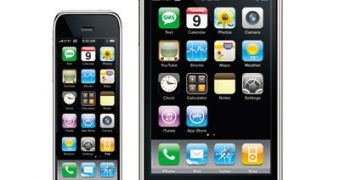A Wall Street analyst believes Apple is on track to release a couple of new iPhones, with both larger and smaller screens, after checking with sources in Apple’s overseas supply chain. Rumors of Apple planning the launch of an iPhone “nano” emerged years ago, and have since died with strong indication from Apple that the company does not wish to create cheap products, feature-wise.
Kaufman Bros. analyst Shaw Wu reportedly said these two iPhones could launch next year on new carriers other than AT&T, which currently has exclusive rights to sell the iPhone in the US.
"Our sources believe these likely represent new high-end and low-end iPhone models to complement its current iPhone 4," Wu wrote in a note to investors, according to a report by AppleInsider.
"One possibility we are picking up is a ‘mini’ or ‘nano’ iPhone with a smaller candybar form factor leveraging technology in its new mini touchscreen iPod nano."
"We believe Apple moving to a more complete iPhone product line makes strategic sense in that its iPhone 4 addresses only the high-end of the market," he said.
"We think Apple should take a page out of its iPod playbook where it has had a lot (of) success with a 3-tier strategy addressing entry-level, mid-range and high-end, making it difficult for competitors."
However, Apple already offers two iPhone models that are priced at $199 (for the 16GB iPhone 4) and $99 (for the 8GB iPhone 3GS) in the U.S. with a two-year AT&T contract.
The company is also known to respond to competition in more elegant ways. Creating cheap products to appeal the masses is not on Apple’s agenda.
Yet Wu upholds that the scalability of iOS could allow Apple to make a "fuller iPhone product line." This, according to the same report, would allow Apple to offer even greater competition against Google Android, the analyst suggested.
Providing the new iPod nano as an example, Wu also told investors that Apple’s small player runs iOS, which isn’t entirely true.
The software looks, works and feels much like iOS, but it’s known to be a different operating system.

 14 DAY TRIAL //
14 DAY TRIAL //